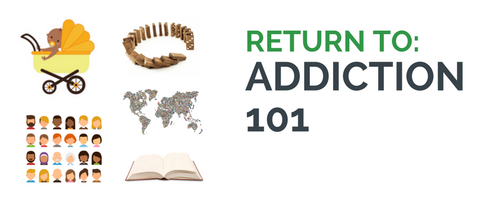Etiology is the investigation of factors and influences over time that lead to substance use disorder development.
ETIOLOGICAL RESEARCH
Etiological research works to identify the likely causes and correlates of drug use. There are multiple factors that have been identified that contribute to the development of a substance use disorder. However, no one factor, or no one set of factors, will affect all individuals similarly or explain drug use completely.
The utility of etiological theories are often judged by if they have:
- Descriptions of common influences (risk and protective)
- Transitions in life (e.g., age of first regular use, age of substance use disorder onset)
IMPORTANT DEFINITIONS
RISK FACTORS
Factors or variables that increase the likelihood for development of a substance use disorder. They are factors that increase the probability of an individual developing a disease or vulnerability, which is a predisposition to a specific disease process.
PROTECTIVE FACTORS
Factors or variables that decrease the likelihood for development of a substance use disorder (they protect the individual). They are factors that moderate the effects of risk conditions to reduce vulnerability and enhance individual resiliency.
VULNERABILITY
The degree of accumulated risk factors at it relates to overall susceptibility to substance use disorder.
INDIVIDUAL RISK AND PROTECTIVE FACTORS
(National Institute on Drug Abuse, 2018)
BIOLOGICAL FACTORS
- GENETIC VULNERABILITY
-
- Genes account for 40-60% of the risk for addiction development
- PHYSIOLOGICAL VULNERABILITY
-
- Differences in metabolic variations by race; for example, Native American and Caucasian populations more likely than Asian populations to develop a substance use disorder because of the polymorphism of two liver enzymes
- GENDER
-
- Males are more likely than females to develop a substance use disorder
PSYCHOSOCIAL FACTORS
- PERSONALITY TRAITS
-
- Personality traits such as high impulsivity, aggression, and sensation seeking
- PSYCHOPATHOLOGY
-
- The prevalence of other mental health disorders, such as major depressive disorder, anxiety disorder, schizophrenia, attention-deficit hyperactivity disorder (ADHD), or post-traumatic stress disorder (PTSD)
CONTEXTUAL FACTORS
- FAMILIAL FACTORS
-
- RISK
- Having a parent or sibling that has a substance use disorder
- Lack of family involvement, parental supervision, or support
- Poor quality of the child-parent relationship
- Family disruptions such as divorce, acute or chronic stress
- Social isolation
- Abuse (e.g. sexual, physical, emotional)
- PROTECTIVE
- Positive mutual attachment between parent and child
- A parent’s drug use can be offset by the non-use of the other parent
- Marriage
- Child-rearing responsibilities
- RISK
- PEER FACTORS
-
- RISK
- Substance use among peers and time spent with substance-using peers
- Poor social skills
- PROTECTIVE
- Positive group norms
- Positive relationships
- RISK
- SOCIOCULTURAL OR ENVIRONMENTAL FACTORS
-
- RISK
- Accessibility of a substance (e.g., number of liquor stores)
- Community drug use patterns (e.g., individual usage of neighbors)
- Low socioeconomic status or community poverty
- Social and legal policies such as taxes, purchase or use restrictions, enforcement, legal status, penalties, and school anti-drug policies
- Media influence such as the frequency of exposure and nature of the representation of alcohol and other drugs
- PROTECTIVE
- Neighborhood pride
- RISK
- OTHER FACTORS
-
- RISK
- Exposure to physical, sexual, or emotional abuse or trauma
- Age at first use of alcohol and other drugs
- PROTECTIVE
- Religiosity
- Employment
- Academic competence
- RISK
SEE INFOGRAPHIC:
- CITATIONS
-
- National Institute on Drug Abuse (2018). Drugs, brains, and behavior: The science of addiction. ePublication.
- U.S. Institute of Medicine Committee on Opportunities in Drug Abuse Research (1996). Pathways of addiction: Opportunities in drug abuse research. Washington (DC): National Academies Press.



